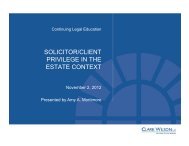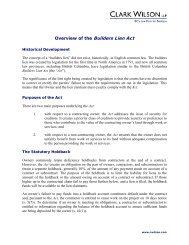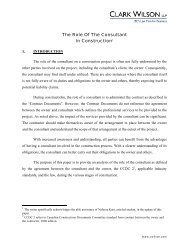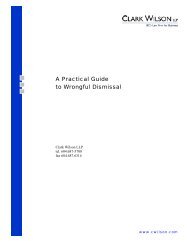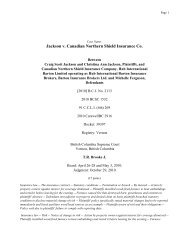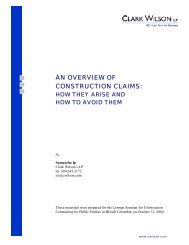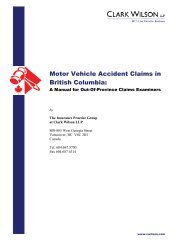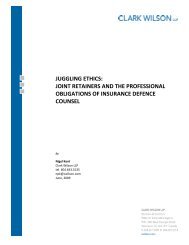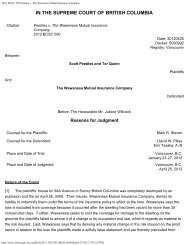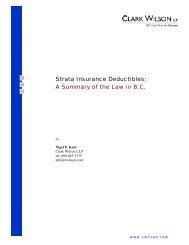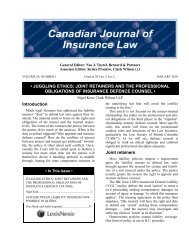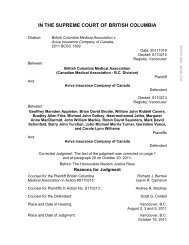You also want an ePaper? Increase the reach of your titles
YUMPU automatically turns print PDFs into web optimized ePapers that Google loves.
Kruger Products Limited v. First Choice Logistics Inc. Page 18<br />
negligence attributed to the tenant. Subrogation was barred partly in Agnew-<br />
Surpass, where the Court was split, and was barred completely in the latter two<br />
cases.<br />
[36] The three cases are well-known to insurance practitioners and I do not intend<br />
to rehearse their legal reasoning in detail. It is fair to say that Chief Justice Laskin’s<br />
minority position in Agnew-Surpass evolved into the majority position in the other<br />
two cases, such that by the time T. Eaton was decided, the landlords’ covenant to<br />
insure their tenant’s premises was regarded as a “supervening covenant” that<br />
prevailed even where the tenant’s negligence had caused the loss. The Chief<br />
Justice characterized the issue in T. Eaton thus:<br />
2013 BCCA 3 (CanLII)<br />
... It is whether, in circumstances where, by the lease, the tenant is under an<br />
obligation to repair, and where its obligation to repair does not extend to<br />
repairing damage from accidental (as contrasted with negligent) fires, it is<br />
entitled, as between it and the landlord, to claim the benefit of a fire insurance<br />
policy (providing indemnity for loss arising from fires negligently caused),<br />
which the landlord had covenanted with the tenant to provide.<br />
... This is not a case where one has to consider whether there is some<br />
provision exonerating one contracting party from liability to the other for the<br />
former's negligence. Rather is it a case where a supervening covenant has<br />
been given and taken to cover by an insurance policy the risk of loss from a<br />
fire caused by negligence. An insurer could not refuse to pay a claim for loss<br />
by fire merely because the fire arose from the insured's negligence. I can see<br />
no reason why its position can be any better against a tenant, whose<br />
negligence caused loss by fire, if the lease with the landlord makes it clear<br />
that a policy was to be taken out by the landlord to cover such fires, and a<br />
policy is written which does so. In short, the insurer can claim only by<br />
subrogation under the lease. [At 755-6; emphasis added.]<br />
[37] A helpful summary of the evolution of the trilogy was provided in Madison<br />
Developments Ltd. v. Plan Electric Co. (1997) 36 O.R. (3d) 80 (Ont. C.A.), where<br />
Carthy J.A. stated:<br />
... The law is now clear that in a landlord-tenant relationship, where the<br />
landlord covenants to obtain insurance against the damage to the premises<br />
by fire, the landlord cannot sue the tenant for a loss by fire caused by the<br />
tenant's negligence. A contractual undertaking by the one party to secure<br />
property insurance operates in effect as an assumption by that party of the<br />
risk of loss or damage caused by the peril to be insured against. This is so<br />
notwithstanding a covenant by the tenant to repair which, without the<br />
landlord's covenant to insure, would obligate the tenant to indemnify for such<br />
a loss. This is a matter of contractual law, not insurance law, but, of course,



